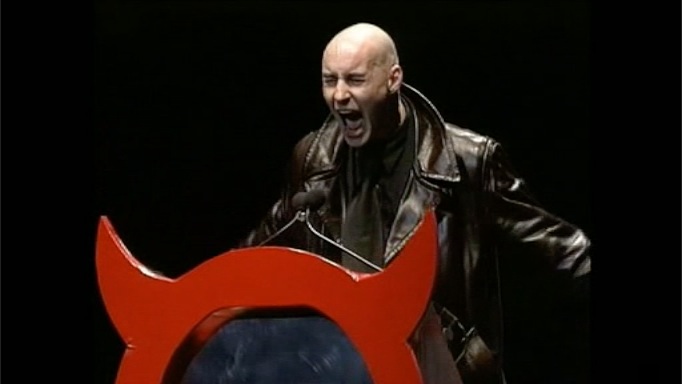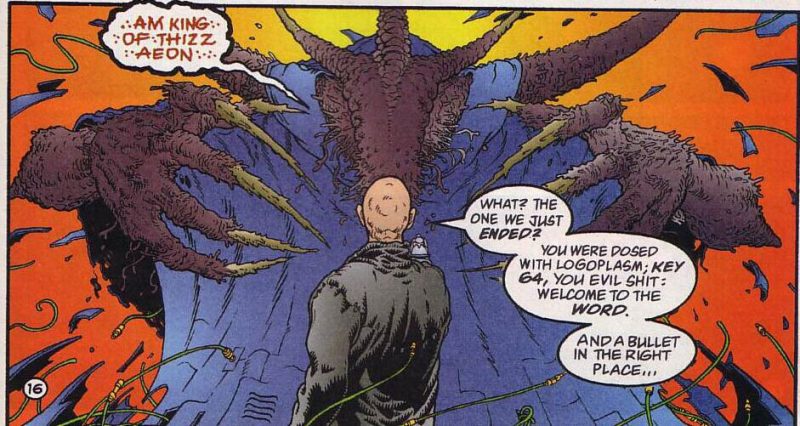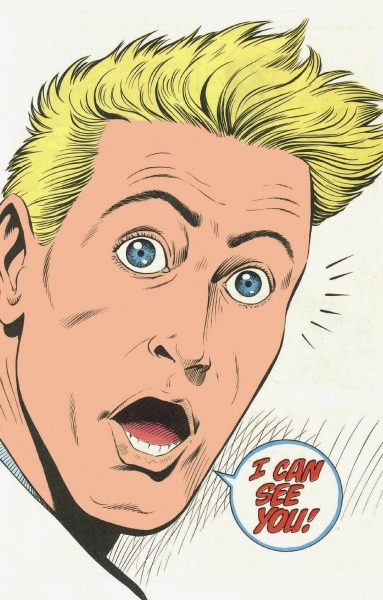Is Grant Morrison Actually Magic?
No.
Not in the Merlin sense, anyway. He thinks he is. I'm not convinced. Truth be told, I am and have always been a huge fan of Grant Morrison. He's not without his issues, sure, and he's had as many misses as he's had hits, but I've been wowed by pretty much all I've read. There's always a
wildness to them. A kind of insane, almost rambling creativity. I thought it was just inspiration stemming from hallucinogens. Turns out there's one more piece to the puzzle.
Magic. Specifically,
chaos magic. Stay with me here, it's going to get a little bonkers. Basically, chaos magic is like DIY reality bending. Practitioners make up their own rituals, drawing from everywhere -- belief systems, sci-fi, pop culture, even comic books -- to perform "spells". It's a looser, New Age version of spooky robes-and-candle magic.
There have been a big ol' handful of practitioners since its creation, and big names too. William S. Burroughs, Robert Anton Wilson, and even Die Antwoord have dipped their toes in the nebulous rivers of chaos magic. Grant Morrison is firmly rooted in that group. You can listen to him
talk about it for 45 minutes.
[caption id="attachment_91547" align="aligncenter" width="623"]
 It starts like this
It starts like this[/caption]
Morrison believes that stories, any work of art really, are basically huge spells called Hypersigils. By creating these characters and settings from nothing, you actually change and effect the universe on a metaphysical level. As an example, if you create a story where, say, a character whose name is an anagram of yours goes out and finds a ton of success as a lumberjack, you'll find you can too.
I know, it's super weird, but Morrison's all in on it. He has
said his book
The Invisibles was "a six-year long sigil in the form of an occult adventure story which consumed and recreated my life during the period of its composition and execution." I
wrote a while back on
The Invisibles. I postulated that his character, King Mob, was a fairly obvious stand-in for Morrison himself. Turns out, I was right. The comic was some kind of super-spell designed to manipulate Morrison's life.
Supposedly, when he wrote about King Mob meeting a certain type of girl, he'd meet that same kind of woman in real life. When he wrote King Mob into a torture scene, he became deathly ill, and only recovered once he wrote King Mob
out of it. He considers the book a dangerous exploration of his... I don't know... magical ability?
[caption id="attachment_91548" align="aligncenter" width="669"]
 Well this makes perfect sense
Well this makes perfect sense[/caption]
The knowledge of Morrison's belief in chaos magic adds an interesting meta-level to all his books now. Reading back, you get a sense that they're bigger. More self aware. A lot of his stories, especially in the superhero genre, involve the characters dealing with warped reality, with their existence in
our world, or the very
idea of superheroes.
His Animal Man realized he was in a comic book and spoke to the readers. His Superman met the
concept of Superman AS WELL AS faced off against Superdoomsday -- the concept of a Gritty Superman that kills off less marketable Supermen. Then whatever happened to Batman when Batman "died".
I think the idea that these stories are as real as our world, that they reflect fully on our reality, is the main reason they're so good. With Grant Morrison's stories, there's a connection with the readership that other stories don't generally have. I don't think it's because they're
literal (ha!) spells. I think it's simply the idea that he's casting magic puts Morrison in a really unique head space for writing. Maybe, in the end, that's the most powerful magic of all.
[caption id="attachment_91549" align="aligncenter" width="366"]
 YOU! HE'S TALKING TO YOU, ANTHONY!
YOU! HE'S TALKING TO YOU, ANTHONY![/caption]
So there you have it. The story of Magical Grant Morrison. I don't believe in magic, at least not in the way he's talking about. I think that there's a certain "magic" in making stories, creating something from nothing, and the effect that has on people. I don't really think it can actually change reality.
Unless... no, no, it probably doesn't.
Although...
 It starts like this[/caption]
Morrison believes that stories, any work of art really, are basically huge spells called Hypersigils. By creating these characters and settings from nothing, you actually change and effect the universe on a metaphysical level. As an example, if you create a story where, say, a character whose name is an anagram of yours goes out and finds a ton of success as a lumberjack, you'll find you can too.
I know, it's super weird, but Morrison's all in on it. He has said his book The Invisibles was "a six-year long sigil in the form of an occult adventure story which consumed and recreated my life during the period of its composition and execution." I wrote a while back on The Invisibles. I postulated that his character, King Mob, was a fairly obvious stand-in for Morrison himself. Turns out, I was right. The comic was some kind of super-spell designed to manipulate Morrison's life.
Supposedly, when he wrote about King Mob meeting a certain type of girl, he'd meet that same kind of woman in real life. When he wrote King Mob into a torture scene, he became deathly ill, and only recovered once he wrote King Mob out of it. He considers the book a dangerous exploration of his... I don't know... magical ability?
[caption id="attachment_91548" align="aligncenter" width="669"]
It starts like this[/caption]
Morrison believes that stories, any work of art really, are basically huge spells called Hypersigils. By creating these characters and settings from nothing, you actually change and effect the universe on a metaphysical level. As an example, if you create a story where, say, a character whose name is an anagram of yours goes out and finds a ton of success as a lumberjack, you'll find you can too.
I know, it's super weird, but Morrison's all in on it. He has said his book The Invisibles was "a six-year long sigil in the form of an occult adventure story which consumed and recreated my life during the period of its composition and execution." I wrote a while back on The Invisibles. I postulated that his character, King Mob, was a fairly obvious stand-in for Morrison himself. Turns out, I was right. The comic was some kind of super-spell designed to manipulate Morrison's life.
Supposedly, when he wrote about King Mob meeting a certain type of girl, he'd meet that same kind of woman in real life. When he wrote King Mob into a torture scene, he became deathly ill, and only recovered once he wrote King Mob out of it. He considers the book a dangerous exploration of his... I don't know... magical ability?
[caption id="attachment_91548" align="aligncenter" width="669"] Well this makes perfect sense[/caption]
The knowledge of Morrison's belief in chaos magic adds an interesting meta-level to all his books now. Reading back, you get a sense that they're bigger. More self aware. A lot of his stories, especially in the superhero genre, involve the characters dealing with warped reality, with their existence in our world, or the very idea of superheroes.
His Animal Man realized he was in a comic book and spoke to the readers. His Superman met the concept of Superman AS WELL AS faced off against Superdoomsday -- the concept of a Gritty Superman that kills off less marketable Supermen. Then whatever happened to Batman when Batman "died".
I think the idea that these stories are as real as our world, that they reflect fully on our reality, is the main reason they're so good. With Grant Morrison's stories, there's a connection with the readership that other stories don't generally have. I don't think it's because they're literal (ha!) spells. I think it's simply the idea that he's casting magic puts Morrison in a really unique head space for writing. Maybe, in the end, that's the most powerful magic of all.
[caption id="attachment_91549" align="aligncenter" width="366"]
Well this makes perfect sense[/caption]
The knowledge of Morrison's belief in chaos magic adds an interesting meta-level to all his books now. Reading back, you get a sense that they're bigger. More self aware. A lot of his stories, especially in the superhero genre, involve the characters dealing with warped reality, with their existence in our world, or the very idea of superheroes.
His Animal Man realized he was in a comic book and spoke to the readers. His Superman met the concept of Superman AS WELL AS faced off against Superdoomsday -- the concept of a Gritty Superman that kills off less marketable Supermen. Then whatever happened to Batman when Batman "died".
I think the idea that these stories are as real as our world, that they reflect fully on our reality, is the main reason they're so good. With Grant Morrison's stories, there's a connection with the readership that other stories don't generally have. I don't think it's because they're literal (ha!) spells. I think it's simply the idea that he's casting magic puts Morrison in a really unique head space for writing. Maybe, in the end, that's the most powerful magic of all.
[caption id="attachment_91549" align="aligncenter" width="366"] YOU! HE'S TALKING TO YOU, ANTHONY![/caption]
So there you have it. The story of Magical Grant Morrison. I don't believe in magic, at least not in the way he's talking about. I think that there's a certain "magic" in making stories, creating something from nothing, and the effect that has on people. I don't really think it can actually change reality. Unless... no, no, it probably doesn't. Although...
YOU! HE'S TALKING TO YOU, ANTHONY![/caption]
So there you have it. The story of Magical Grant Morrison. I don't believe in magic, at least not in the way he's talking about. I think that there's a certain "magic" in making stories, creating something from nothing, and the effect that has on people. I don't really think it can actually change reality. Unless... no, no, it probably doesn't. Although...